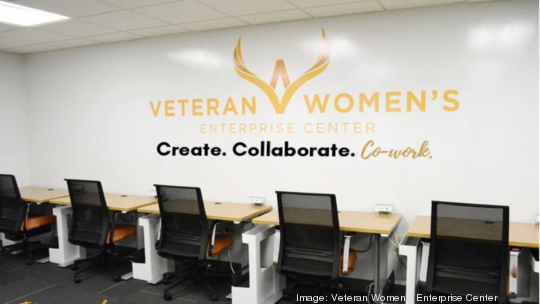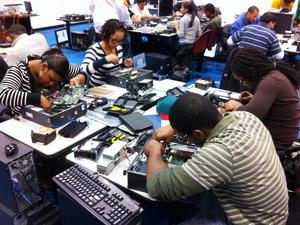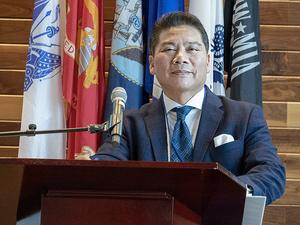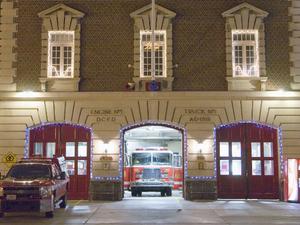
A former Navy vet herself, VR Small knows what fellow female veterans need to take their military skills and turn it into entrepreneurship.
And during a time when economic uncertainty has affected many small businesses across the country, she has led the Dallas-based Veteran Women’s Enterprise Center (VWEC) through new digital changes to see new growth and an expanded reach to help more female vets during the crisis.
“We’re really trying to build an entrepreneur ecosystem where there’s a community,” Smalls told NTX Inno. “This is the time for women to really figure out how to come together and how to work together because there are so many opportunities for each one to pull the next one up to the next level.”
Since launching in 2017, the VWEC has been on a mission to help women who are transitioning out of military life learn the business and leadership skills they need to start their own businesses. Based out of a 2,700 square-foot space in the Veterans Resource Center in southern Dallas, the center provides educational workshops, grant resources, courses and activities for female vets, working with them from start to when they land their first grant or contract.
The VWEC space also features a female-exclusive coworking space, which Small said allows vets dealing with military sexual trauma to find a safe space to work and develop in. She also added that the coworking allows for vets with different skills to work together on potential business ventures.
“We’re bringing women together who already understand each other…it gives you a level of comfort, you have that camaraderie because you already have that relationship of being part of something bigger,” Small said.
Amid lockdown orders and safety concerns, the VWEC had to move its in-person programing to a virtual format. However, before the pandemic this would have been difficult, as the center had been facing internet connectivity issues due to the fact that it's fittingly located in a former armory building, making it difficult even in normal times to find connection in parts of the space. But in June, the center received a grant from The Boone Family Foundation, allowing it to pivot to a new virtual reality by July.
“I always tell people the pandemic has been like the good, the bad and the totally unexpected for us,” Small said.
The move to digital has helped the VWEC grow rapidly during the crisis. Small said that through the center’s programming, it was able to engage about 500 women, the same number it would usually see over the course of a year. And because the programming has been moved online, the center has been seeing women from other states join in, whereas before the majority came from the DFW region.
“We weren’t thinking outside the box when we should have been,” Small said. “We were forced to do it and being forced to do it because of the pandemic we saw the impact… we’re not going to lose that connection, we’re just going to enhance it.”
With the new pivots and the newfound reach, Small said she feels like the VWEC is starting to reach the potential she envisioned when she founded it. The eventual plan is to create other centers across the country, which it is starting to lay the foundations for with its new connections. She also said she hopes that future centers will also feature a retail space in addition to its other offerings to help women working in the CPG and retail space.
Besides moving its typical programming online, to further help women during this time, the VWEC is launching a Covid-19 Summer Master Class Series. The 25-hour course, open to qualified female veteran entrepreneurs, is designed to help them build management, technology, sales and marketing knowledge. The mentoring program Next Level Business Transformation will provide the educational training, as well as $5,000 grants for the founder’s businesses. The VWEC has also been hosting weekly workshops on topics its members have requested, in addition to bringing on local and state government and business leaders to bring national happenings to a local level.
“We’re really looking at how we can touch businesses, interact with them, not just have these face-to-face sessions where someone is just talking at you and you’re kind of playing with your dog and got your feet up… it’s information you can immediately apply to your business and really help you toward that recovery and moving to the next level,” Small said. “This program is specifically designed, we wrote these grants for [female veterans] so that [they] can get to the table, so that you can get the resources that [they] need so that [they] can succeed. And so that you can get through this Covid-19 experience, and you can continue to grow and expand your business.”
Smalls said that veterans in general face challenges when transitioning to the business world. She said coming into a structure where everything is not always done by the books or taken care of by a central organization can be difficult to navigate. In addition, she said that learning how to lead and work within a team where orders are followed by relationships rather than life-or-death need is a change it can take time to make. Veterans also have to take the skills and specializations they learned in the military and transition that into a business or commercial application.
Beyond plans to develop centers in different states, Small said the VWEC is looking to become a resource for others to help support female veteran-owned businesses. The center has been working to create a national report on women vet entrepreneurs, which Smalls said should eventually allow people to search their businesses based on zip code, as well as search data on the state of development and growth of female vet businesses.
“We’re going to see a different way of doing business. I think all of this has awoken us to the real value of technology and also the true value of data,” Small said. “Our vision is to position women as entrepreneurs in our nation, as leading employers and revenue generators.”
It’s an area Smalls said has been growing but there is still work to do in. According to a census survey of business owners, only 3 percent of female veteran owned businesses have been able to hire employees. And, while the number of female veteran-owned businesses has risen from about 4 percent in recent years, they only make up about 15.2 percent of all veteran-owned businesses, the National Women’s Business Council reports.
“A big piece of it is bringing women veterans out of the shadows,” Small said. “I don’t believe that anyone is more deserving of the American Dream than those who have given up their life to make sure that that dream stays alive. So I want to help every female veteran possible achieve her American Dream for herself and her family and her community.”









